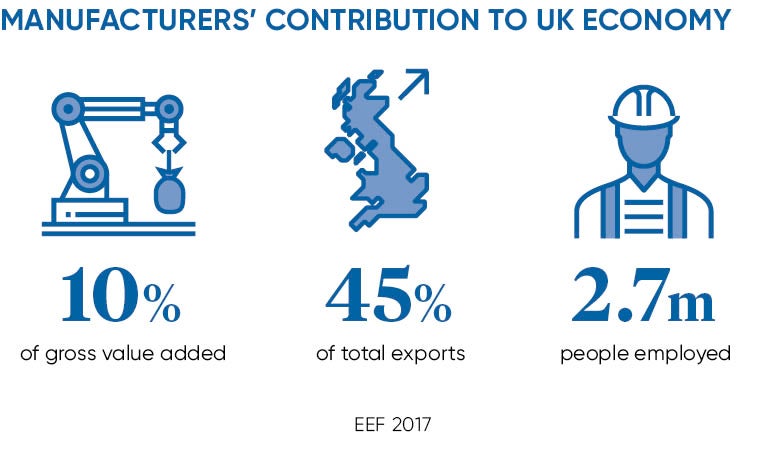The falling pound was supposed to remedy the UK’s trade deficit. Instead the goods trade deficit widened from £11.3 billion in June to £12.7 billion in July, the widest gap since last September.
The numbers hide a lot of colourful stories. Some UK manufacturers are opening the bubbly. Manchester-based Francis Kirk Group, which makes industrial fasteners, signed chunky deals in the United States and Middle East to take turnover from £4.75 million to £7 million by the year-end. That’s what you can do when exports are 40 per cent of sales.
And the whisky industry never seems to have a bad year. Whisky alone now accounts for 20 per cent of all UK food and drink exports. Half of whisky exports are to outside the European Union.
But the truth is the UK isn’t reaching its full potential. Germany and Japan are in the premier league of manufacturing. Switzerland produces three times as much per head. Sweden double. What we have is a constellation of superstar performers, such as JCB, McLaren and Jaguar Land Rover, but they are too few.
The question is how can we compete with the best? Arguably, it’s not that baffling. Industry veterans know all too well where UK manufacturing struggles. Here are the four main ingredients. Fix these and we’ll be giving the Germans and run for their money.

Training
The failure to produce enough engineers is a national tragedy. The industry body EngineeringUK says the country needs 69,000 more engineers a year just to meet current demand. Naturally, if we produced these engineers then demand would soar as employers thrived, making the real total much, much higher.
When the government investigated why there is such a shortfall, a key reason identified was the reputation of engineering. Only 15 per cent of UK children would consider a career in it and 40 per cent called it “boring”. Half thought engineering “dirty”. Only 12 per cent of female university students wanted a career in manufacturing.
The sector has thrown dozens of initiatives at the problem, from Ada Lovelace Day to encourage women in STEM – science, technology, engineering and mathematics – to direct inventions in schools. The new apprenticeship levy may be the game-changer we’ve been waiting for as companies must spend 0.5 per cent of salaries on apprenticeships.
Tie-ups with universities must become normal
Knowledge-transfer partnerships, as they are known, are incredibly productive. The University of Edinburgh has been a national leader for more than 40 years. Between 2010 and 2015 it churned out 836 licence agreements from technology developed in-house. It claims 189 spin-outs.
Manufacturing needs pioneers, in the most romantic interpretation of the word
Research parks are a productive way to bring academics and entrepreneurs together. The University of Surrey owns the astonishingly productive Surrey Research Park, a sprawling campus near Guildford. Home to 140 companies, the idea is to commercialise technologies developed in universities from all over the UK.
Focus on ultra-high tech
A standout example is the field of graphene. In 2004 researchers at the University of Manchester noticed the bizarre properties of single sheets of carbon atoms, known as graphene. The work led to two Nobel Prizes.
Graphene is the strongest material known to man, 200 times stronger than steel. It’s stretchy, able to be pulled to 20 per cent its normal size. Usually hard materials shatter when stretched. And it is electrically responsive. Connect a current and it can be either 200 times more conductive than copper or an insulator with almost no conductivity. Graphene could be the miracle material for computer chips, bullet-proof jackets and anti-corrosive paint.
On this occasion, the UK is investing as it should. A £61-million National Graphene Institute in Manchester aims to capitalise on our expertise in this sector. The model has worked before. The London Institute for Nanotechnology, a joint venture of UCL and Imperial College, develops world-beating technology at the nano-scale. When the UK invests like this the results are almost universally positive.
The spirit of adventure
Manufacturing needs pioneers, in the most romantic interpretation of the word. The US is teeming with buccaneering figures. Elon Musk is capturing the hearts of a new generation of Americans with his Tesla driverless car. He also has a space project, Space X. And when stuck in traffic, he announced a city-to-city tunnel drilling company called The Boring Company. The low-cost tunnels may make hyperloops possible – vacuum tubes enabling travel from New York to Washington DC in less than 30 minutes.
When Musk wants to brainstorm, he can chat to his friends Larry Page and Sergei Brin, founders of Google, who are also building driverless cars. Or Jeff Bezos at Amazon, the king of retail who is also aiming to become a master of robotics. In the US these moguls are famous. Entrepreneurs such as Sara Blakely, who built a billion-dollar fortune with Spanx underwear, inspire the next generation.
The UK hasn’t generated a new celebrity in manufacturing in 20 years. Yet there is no shortage of candidates. Claire Williams is the boss of the Williams Formula 1 team. She’s a ready-made role model. Chris Rea of industrial seals brand AESSEAL exports to 104 nations. Demis Hassabis is the founder of DeepMind, which developed a self-learning artificial intelligence engine that beat the world’s top Go board-game players. Hassabis is a legend in Silicon Valley. Yet he’s barely known here, outside tech circles.
The goal of the UK should be to overtake Italy and France in manufacturing output within a decade. There’s no doubt the ingredients are all there. But until we fix these issues, we’ll remain in their wake.

